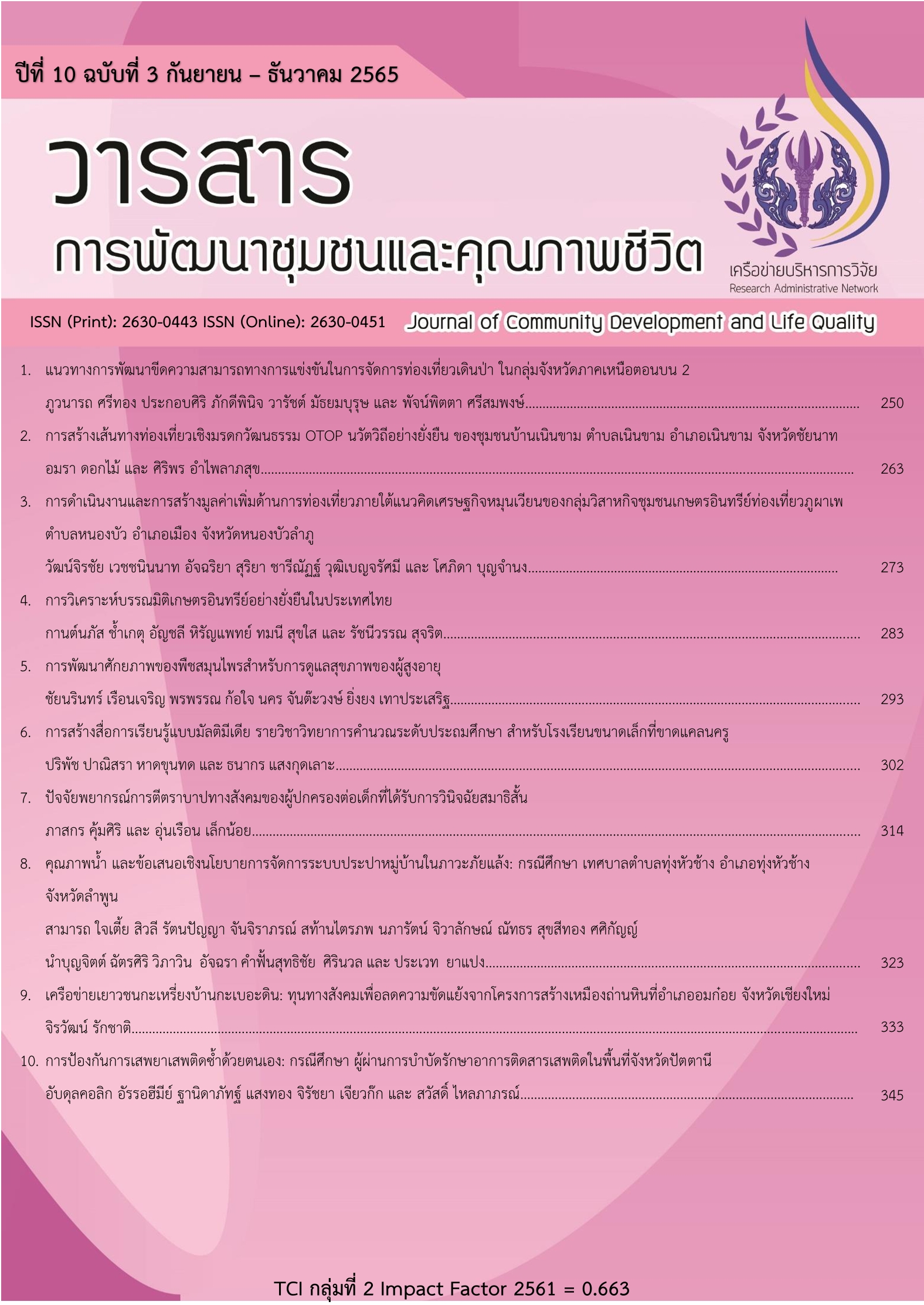การป้องกันการเสพยาเสพติดซ้ำด้วยตนเอง: กรณีศึกษา ผู้ผ่านการบำบัดรักษาอาการติดสารเสพติดในพื้นที่จังหวัดปัตตานี
Main Article Content
บทคัดย่อ
การวิจัยครั้งนี้เป็นการวิจัยเชิงคุณภาพมีวัตถุประสงค์เพื่อศึกษาการป้องกันการใช้สารเสพติดซ้ำด้วยตนเองของผู้ที่ผ่านการบำบัดรักษาอาการติดสารเสพติดในพื้นที่จังหวัดปัตตานี โดยมีกลุ่มผู้ให้ข้อมูลที่ใช้ในการวิจัยครั้งนี้ จำนวน 30 คน ผู้วิจัยเลือกใช้การสุ่มตัวอย่างแบบเจาะจง กฎเกณฑ์ของกลุ่มผู้ให้ข้อมูลต้องเป็นผู้ที่มีความเกี่ยวข้องกับปัญหาในการวิจัยเพื่อให้ได้มาซึ่งข้อมูลเที่ยงตรงและเป็นข้อมูลเชิงลึกอย่างแท้จริง และเก็บรวบรวมข้อมูลด้วยแบบสัมภาษณ์ และวิเคราะห์ผลด้วยการตีความแต่ละประเด็นตามวัตถุประสงค์ในการวิจัยใช้วิธีนำเสนอผลการวิจัยเชิงพรรณนาความเกี่ยวกับเนื้อหาที่ค้นพบ ผลการวิจัยพบว่า การป้องกันตนเองในการใช้สารเสพติดซ้ำ พบว่า (1) การส่งเสริมความรู้ ทักษะชีวิต และสร้างภูมิคุ้มกันด้วยหลักศาสนา (2) การวางแผนการกลับไปใช้ชีวิตหลังจากผ่านการบำบัดรักษาอาการติดสารเสพติดสำเร็จ (3) การกระตุ้นในระดับจิตใต้สำนึกและความคิด ความเชื่อความคิดที่มีต่อการสารเสพติด (4) การสร้างความเชื่อมั่นให้เกิดขึ้นในตนเองว่าตนเอง สามารถหลีกเลี่ยงการกลับเข้าสู่วงจรเดิมได้ (5) การปรับเปลี่ยนพฤติกรรมทางความคิด หรือเรียกว่า การปรับโครงสร้างความรู้ความเข้าใจเป็นกระบวนการทางจิต (6) การเข้าสู่กระบวนการบำบัดรักษาอาการติดสารเสพติด
Article Details

อนุญาตภายใต้เงื่อนไข Creative Commons Attribution-NonCommercial-NoDerivatives 4.0 International License.
กองบรรณาธิการขอสงวนสิทธิ์ในการตรวจและแก้ไขบทความที่เสนอเพื่อตีพิมพ์ในวารสารการพัฒนาชุมชนและคุณภาพชีวิต
บทความหรือข้อความคิดเห็นใด ๆ ที่ปรากฏในวารสารการพัฒนาชุมชนและคุณภาพชีวิต เป็นวรรณกรรมของผู้เขียนโดยเฉพาะคณะผู้จัดทำไม่จำเป็นต้องเห็นด้วย และไม่ใช่ความรับผิดชอบของมหาวิทยาลัยและคณะผู้จัดทำ / บรรณาธิการ
เอกสารอ้างอิง
Chainakin, C., C. Prachapiphat and A. Pumprawai. 2016. Cessation of repeated amphetamine addiction: A case study of rehabilitated persons in behavior modification camp by the therapeutic community method. Kuakarun Journal of Nursing 23(2): 248-262. (in Thai)
Chaipichitpan, N. 2013. Motivational enhancement therapy: Alternative care for drug abuse patient. Thammasat Medical Journal 13(1): 98-108. (in Thai)
Chunmanee, R., P. Hengudomsub, C. Nabkasorn and D. Vatanasin. 2015. Effects of group cognitive behavioral therapy program on perceived self-efficacy and intention to drug abstinence among male patients with amphetamine dependence. Thai Pharmaceutical and Health Science Journal (10)4: 155-162. (in Thai)
Drug Prevention and Suppression Center. 2021. Strategic plan for treatment and rehabilitation of drug patients. Ministry of Public Health, Nonthaburi. (in Thai)
Jandeang, B. 2017. Analysis of current drug situation problem. Journal of Research and Development Institute, Rajabhat Maha Sarakham University (4)2: 37-56.
Khorphon, S., J. Pankeaw T. Sarobol S. Sitthisongkram S. Chaisrisawat S. Chaisrisawat and P. Norsak. 2014. Use of Participatory Action Research (PAR) in Preventing and Solving Problems Caused by Alcohol Consumption in the Community of Nong Toa Kammai Village, Pa Phai Sub-district, San Sai District, Chiang MaiProvince. Journal of Community Development and Life Quality (2)3: 313-324. (in Thai)
Netnuanyai, R., C. Nitchanet., S. Phukong., S. Boonyapithak and D. Phukao. 2014. thai youth’s voluntary applications of drug treatment. Journal of the Association of Researchers (19)2: 36-44. (in Thai)
Office of Narcotics Control Board. 2019. Drug situation in the lower southern region. (Online). Available: https://www.oncb.go.th/ONCB_OR9/picture/Forms/Thumbnails.aspx. (August 4, 2019). (in Thai)
Pochnagone, S. 2020. The empowerment model for addicted patients and family to prevent relapse. Journal of Social Science and Buddhistic Anthropology (5)12: 305-323. (in Thai)
Princess Mother National Institute on Drug Abuse Treatment. 2012. Relapse prevention skill group. Department of Medical Services, Bangkok. (in Thai)
Prochaska, J.O. and W.F. Velicer. 1997. The transtheoretical model of health behavior change. American Journal of Health Promotion 12(1): 38-48.
Thatsananchalee, P. 2011. The process of non-becoming amphetamine addict: A case study of rehabilitated person in process of correctional system. Interdisciplinary Sripatum Chonburi Journal 1(3): 36-48. (in Thai)
Tongtub, K. and P. Uthis. 2014. The effect of coping skills training in relapse prevention program on amphetamine abstinence self-efficacy of amphetamine users. Journal of Psychiatric Nursing and Mental Health 28(2): 88-99. (in Thai)


